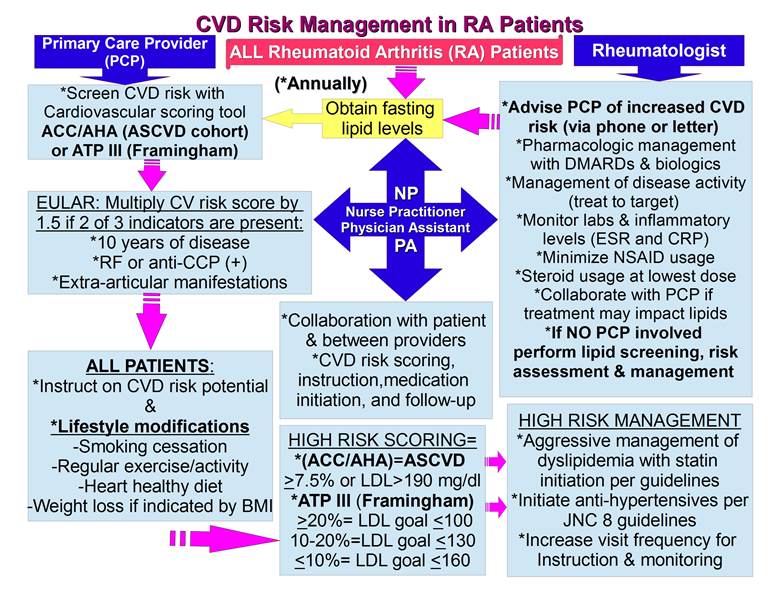Session Information
Session Type: ACR Poster Session C
Session Time: 9:00AM-11:00AM
Background/Purpose: Despite the fact that patients with rheumatoid arthritis (RA) experience a 50-60% increased risk of developing cardiovascular disease (CVD), substantial gaps remain in the knowledge and application of risk prevention measures in RA patients. There is no standardized guideline or protocol for identification and management of the CVD risk in the RA population. The purpose of this study is to develop an algorithm based on current evidence with best practice measures for identification and management of CVD risk in the RA population.
Methods: An extensive review of literature was performed exploring and evaluating CVD impact in the RA population from 2009-2015 to identify current evidence based measures utilized in this population. Retrospective chart review of RA patients at a large community medical center identified the absence of consistent CVD risk screening. The American College of Cardiology/American Heart Association (ACC/AHA) guidelines and the National Cholesterol Education Program (NCEP) Adult Treatment Panel (ATP) III guidelines were extrapolated to provide the foundation for the development of an algorithm for providers to reflect current best practice to improve patient outcome management.
Results: A review of literature reveals several barriers to the management of CVD risk in RA patients. No standardized guidelines exist relative to the CVD risk management in the RA patient, but European League Against Rheumatism (EULAR) has made recommendations. Existing CVD risk scoring tools often underestimate risk, especially in RA. Computed tomography angiography (CTA) reveals higher plaque burden in asymptomatic RA patients without pre-existing CVD. Lipid knowledge remains incomplete with respect to epidemiology and pathogenesis of RA. Chart review of 35 RA patients at a community medical center revealed that only 40% contained any recorded lipid panel results; in the past year only 11.5% of the reviewed charts contained documentation of lipid panel results. An algorithm was developed to suggest improvements in CVD risk management in the RA population. Increased collaboration between the primary care provider, rheumatologist, and nurse practitioner or physician assistant may enhance overall CVD management (see algorithm CVD Risk Management in RA Patients).
Conclusion: There is a paucity of identification and/or management of CVD in this population. An algorithm was developed in order to help providers identify aggressive CVD strategies, including lifestyle instruction as a standard of care in the RA population, thus improving the long term CVD outcomes. Further research is indicated and should be aimed at the development of CVD risk scoring tools specific for the RA patient, with concrete guidelines on the CVD risk in the RA population. Further studies involving the use of imaging and other alternate methods of risk identification are indicated.
To cite this abstract in AMA style:
Soikkeli K, Ehresmann G. Cardiovascular Disease: The Hidden Risk in Persons with Rheumatoid Arthritis [abstract]. Arthritis Rheumatol. 2015; 67 (suppl 10). https://acrabstracts.org/abstract/cardiovascular-disease-the-hidden-risk-in-persons-with-rheumatoid-arthritis/. Accessed .« Back to 2015 ACR/ARHP Annual Meeting
ACR Meeting Abstracts - https://acrabstracts.org/abstract/cardiovascular-disease-the-hidden-risk-in-persons-with-rheumatoid-arthritis/

